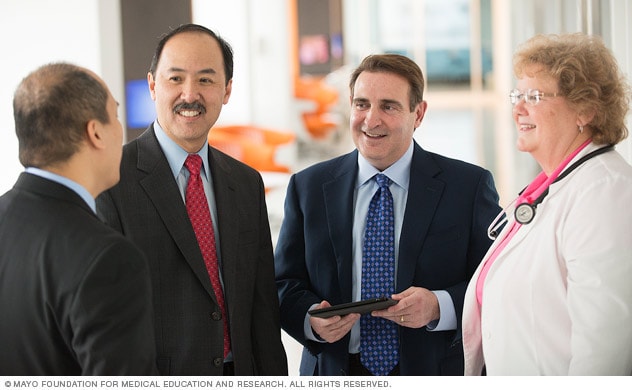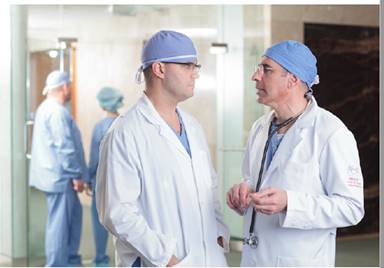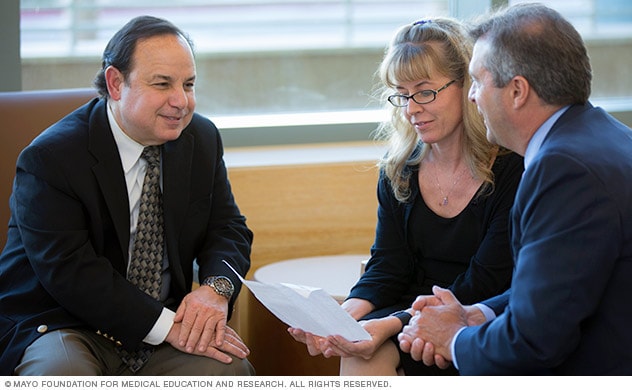Mayo Clinic's approach
 Mayo Clinic VAD team
Mayo Clinic VAD team
A health care team discusses left ventricular assist device (LVAD) care.
At Mayo Clinic, doctors trained in heart disease (cardiologists), doctors trained in heart surgery (cardiovascular surgeons) and other health care providers work together to deliver coordinated, comprehensive care.
- Individualized approach. Doctors at Mayo Clinic provide care for you as a whole person. They take the time to get to know you and work with you to provide exactly the care you need.
- Pediatric expertise. Sometimes a child may need to have a ventricular assist device. Doctors trained in pediatric cardiology and cardiovascular surgery care for children who have heart disease at Mayo Clinic's campus in Minnesota.
- Advanced treatment. Mayo Clinic provides many innovative treatments for people with advanced heart failure, including offering ventricular assist devices as a treatment option for complex heart problems such as restrictive cardiomyopathy, amyloidosis and other high-risk conditions.
- Accessible locations. Mayo Clinic's campuses in Arizona, Florida and Minnesota each offer a Heart Failure Clinic staffed by a team of cardiologists and other specialists trained in evaluating and treating heart failure. Each of these three sites can be accessed by nearby international airports.
- Innovative research. Mayo surgeons have used their expertise to develop new innovative designs of ventricular assist devices to use in specific cases.
Expertise and rankings
Mayo Clinic cardiologists and cardiovascular surgeons have expertise in treating people who may need ventricular assist devices (VADs). Each year, more than 80 people have ventricular assist devices implanted at Mayo Clinic.
 Mayo Clinic VAD care team
Mayo Clinic VAD care team
A team of Mayo health care providers discusses ventricular assist device care.
Nationally recognized expertise
Mayo Clinic campuses are nationally recognized for expertise in cardiology and cardiovascular surgery:
- Mayo Clinic in Rochester, Minn., Mayo Clinic in Phoenix/Scottsdale, Ariz., and Mayo Clinic in Jacksonville, Fla., are ranked among the Best Hospitals for heart and heart surgery by U.S. News & World Report.
- Mayo Clinic Children's Center in Rochester is ranked the No. 1 hospital in Minnesota, and the five-state region of Iowa, Minnesota, North Dakota, South Dakota and Wisconsin, according to U.S. News & World Report's 2023–2024 "Best Children's Hospitals" rankings.
 Mayo Clinic care team
Mayo Clinic care team
Mayo Clinic health care providers work as a team to care for people who may need ventricular assist devices.
With Mayo Clinic's emphasis on collaborative care, specialists at each of the campuses — Minnesota, Arizona and Florida — interact very closely with colleagues at the other campuses and the Mayo Clinic Health System.
Learn more about Mayo Clinic's cardiovascular medicine and cardiovascular surgery departments' expertise and rankings.
Locations, travel and lodging
Mayo Clinic has major campuses in Phoenix and Scottsdale, Arizona; Jacksonville, Florida; and Rochester, Minnesota. The Mayo Clinic Health System has dozens of locations in several states.
For more information on visiting Mayo Clinic, choose your location below:
Costs and insurance
Mayo Clinic works with hundreds of insurance companies and is an in-network provider for millions of people.
In most cases, Mayo Clinic doesn't require a physician referral. Some insurers require referrals or may have additional requirements for certain medical care. All appointments are prioritized on the basis of medical need.
Learn more about appointments at Mayo Clinic.
Please contact your insurance company to verify medical coverage and to obtain any needed authorization prior to your visit. Often, your insurer's customer service number is printed on the back of your insurance card.
Clinical trials
Explore Mayo Clinic studies of tests and procedures to help prevent, detect, treat or manage conditions.